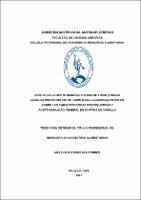Efecto de la sustitución de harina de trigo (triticum aestivum) por residuos de limón (citrus aurantifolia ) en polvo sobre las características fisicoquímicas y aceptabilidad general en muffins de vainilla

View/
Download
(application/pdf: 1.196Mb)
(application/pdf: 1.196Mb)
Date
2017Author(s)
Pereyra Torres, Meysi Sofia
Metadata
Show full item recordAbstract
Se evaluó el efecto de la sustitución de harina de trigo por residuos de limón
en polvo sobre la firmeza, color, fibra cruda, compuestos fenólicos y
aceptabilidad general en muffins de vainilla. Los residuos de cáscara de
limón sutil de la empresa Limones Piuranos SAC, de Sullana-Piura, se
trasladaron hasta los laboratorios de la Escuela Profesional de Ingeniería
en Industrias Alimentarias de la Universidad Privada Antenor Orrego, donde
fue recibida, pesada, molida, tamizada, envasada y almacenada a
temperatura ambiente hasta su posterior uso en la elaboración de los
muffins. Se evaluó la firmeza, color, fibra cruda y compuestos fenólicos
como variables paramétricas. Sensorialmente se evaluó la aceptabilidad y
apariencia general con treinta panelistas no entrenados, utilizando una
escala hedónica de nueve puntos. Los análisis estadísticos se realizaron a
un nivel de confianza del 95%. La prueba de Levene modificada demostró
homogeneidad de varianzas para las variables paramétricas y el análisis
de varianza indicó efecto significativo en la sustitución de harina de trigo
por residuos de limón en polvo sobre la firmeza, color, fibra cruda y
compuestos fenólicos en muffins de vainilla. Con la prueba de Duncan se
determinó que la sustitución de harina de trigo por residuos de limón en
polvo al 5% presentó la mejor firmeza y mejor color, comparado con un
producto comercial, así mismo, que la sustitución al 15% produjo los
muffins con mayor contenido de fibra cruda y fenoles totales. La prueba no
paramétrica de Friedman determinó efecto significativo de la sustitución de
harina de trigo por residuos de limón en polvo sobre la aceptabilidad y
apariencia general; finalmente, la prueba de Wilcoxon denotó que la
sustitución al 5% presentó la mayor apariencia y aceptabilidad general en
muffins de vainilla; considerando a este como el mejor tratamiento en la
investigación. The effect of substitution of the wheat flour for lemon residue on firmness,
color, crude fiber, phenolic compounds and general acceptability in vanilla
muffins was evaluated. The residues of the sutble lemon peel of the
Company Limones Piuranos SAC of Sullana.Perú, moved to the
laboratories of the Professional School of Food Engineering Antenor
Orrego Private University, was received, weighed, milled, sieved, packaged
and stored at room temperature until its subsequent use in the production
of vanilla muffins. The firmness, color, raw fiber and phenolic compunds as
parametric variables was evaluated. Sensory, the overall appearance and
acceptability were applied by thirty untrained judges using a hedonic scale
of nine points. Statistical analyzes were performed with a confidence level
of 95%. The modified Levene test demonstrated homogeneity of variances
for the parametric variables and the analysis of variance indicated a
significant effect of the substitution of wheat flour for residues of lemon
powder in firmness, color, crude fiber and phenolic compounds of vanilla
muffins. The Duncan test determined that the substitution of wheat flour for
residues of lemon poder at 5% presented the better firmness and color
compared to a commercial product, as well, that the substitution to 15%
produced the muffins with greater content of raw fiber and total phenols.
The non-parametric test of Friedman determined significant effect of
substitution of wheat flour for lemon residue on the sensory characteristics;
finally the Wilcoxon test denoted substitution at 5% showed the greastest
overall appearance and acceptability in vanilla muffins, considering this as
the best treatment in the research.
Subject
Collections
- Industrias Alimentarias [152]

